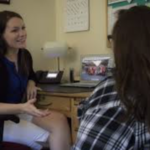How to Get Into University of Wisconsin-Madison
What’s Covered:
- How Hard Is It to Get Into University of Wisconsin-Madison?
- Average Academic Profile of Accepted UW-Madison Students
- What is UW-Madison Looking for?
- How to Apply to UW-Madison
The University of Wisconsin-Madison is a public university known for its strong research reputation. Popular majors at UW-Madison include computer science, economics, biology, finance, and psychology. In this post, we’ll cover basic admission statistics for UW-Madison and you can increase your chances of admission.
How Hard Is It to Get Into University of Wisconsin-Madison?
During Fall 2020, the University of Wisconsin-Madison received 53,800 applications which jumped nearly 17% from the previous year, and the acceptance rate was 54.5% in 2020.
Although UW-Madison is competitive, your personal chances of acceptance may be higher or lower depending on several factors including your test scores, grades, extracurriculars, and diversity profile. Check out our free admissions calculator to calculate your personal chances of acceptance at UW-Madison.
Average Academic Profile of Accepted UW-Madison Students
GPA
The average high school GPA of admitted students was 3.87 in 2020.
ACT/SAT
In 2020, the 25th percentile SAT score was 1300 and the 75th percentile was 1440. For the ACT, the 25th percentile was a score of 27 and 75th percentile was 32. 27% of applicants submitted an SAT score, and 78% submitted an ACT score. UW-Madison is now test optional until 2023.
Class Rank
51% of admitted students were in the top 10% of their graduating class, and 88% in the top 25%.
What is UW-Madison Looking for?
UW-Madison admissions look for students who are strong academically and who are involved in their communities. Besides taking AP, Honors, or IB classes, students can differentiate themselves from other applicants by demonstrating that they are leaders through extracurriculars, work experience, and personal interests. Applicants should write essays that showcase this experience and discuss how their interests are aligned with UW-Madison and how they can contribute to the university’s community.
How UW-Madison Evaluates Applications
According to the UW-Madison’s Common Data Set, the factors below are considered “very important”:
- Rigor of secondary school record
- Application essay
These factors are “important”:
- Academic GPA
- Recommendation
- State residency
These are “considered” :
- Class rank
- Standardized test scores
- Extracurricular activities
- Talent/ability
- Character/personal qualities
- First generation
- Racial/ethnic status
- Volunteer work
- Work experience
These are “not considered” :
- Interview
- Alumni/ae relation
- Geographical residence
- Level of applicant’s interest

1. Achieve at least a 3.87 GPA while taking the most challenging classes available
In order to achieve a 3.87 GPA, you’ll want to have a mix of As and Bs, but mostly As. You’ll want to show admissions officers that you can handle college coursework, so it is recommended that you take the most challenging courses available while still maintaining a high GPA.
When making admissions decisions, some schools use something called the Academic Index. The Academic Index is a score that is created using your transcript, SAT/ACT score, and the course rigor of your classes. This score gives admissions officers an idea of college readiness based on your coursework. This is why you should aim to do well in classes, but also take the most rigorous courses available. Your score is calculated on an index score of 240. Learn more about the academic index and how it may affect your college admissions chances.
2. Aim for a 1440 SAT and 32 ACT
You should try to aim for the 75th percentile scores in order to be more competitive for admission, although anything within the 25th-75th range will be considered. Please keep in mind that UW-Madison does not superscore.
We recommend taking the SAT and ACT if it is safe to do so. If your score is at the 25th percentile or above, you should submit your score. If you still don’t know whether you should submit your scores, you can get guidance on whether you should apply test-optional using our free chancing engine.
To improve your SAT/ACT score, check out these free CollegeVine resources:
- How to Get a Perfect 1600 Score on the SAT
- How to Get a Perfect 36 Score on the ACT
- More SAT Info and Tips
- More ACT Info and Tips
3. Cultivate at least one or two Tier 1-2 extracurriculars (find your “spike”)
When considering extracurricular activities, you should be aware of the different “tiers” of involvement. Typically, your application will be more competitive if you participate in Tier 1 or Tier 2 activities. Below is the breakdown of different tiers.
Tier 1 activities: This would be reserved for highly specialized or competitive activities, such as being a nationally ranked gymnast or qualifying for the International Biology Competition. If you attend a rigorous and competitive summer program it may also be considered.
Tier 2 activities: An active leadership role in a large organization within your school or state would count as a Tier 2 activity. Being the president of student government, leading a large community action organization, or making an all-state selection in a sport would also count.
Tier 3 activities: A Tier 3 activity is an activity where you hold a minor leadership position without guiding the future direction of the organization. Being the treasurer of a club or being recognized as the “player of the week” for a sport may count.
Tier 4 activities: If you participate passively in an activity, it would be counted as a Tier 4 activity. This may include being a member of a sports team, volunteer group, or club.
4. Write engaging essays
Essays are an extremely important aspect of your application, and you should spend an ample amount of time crafting an engaging and thoughtful essay. UW Madison considers the application essay to be a very important part of your application. In your essay, you’ll want to show how you fit into the UW Madison community. Conducting a campus visit or talking with current students about campus culture can help you frame your essay.
Do you need to write your essay, but have no idea where to start? Check out our guide on how to Write the University of Wisconsin Madison 2021-2022 essays.
5. Apply Early Action
Applying Early Action to UW-Madison can increase your chances of admission without requiring you to accept. Typically, Early Action acceptance rates tend to be higher than Regular Action. If you’re interested in UW-Madison, we suggest that you consider applying Early Action.
How to Apply to UW-Madison
Deadlines
|
Application Timeline |
Deadline |
|
Spring Regular Decision |
October 1, 2021 |
|
Fall Early Action |
November 1, 2021 |
|
Fall Regular Decision |
February 1, 2022 |
Application Requirements
- Application: Common Application or UW System Application
- Admissions fee of $60
- 2 required essays
- Official high school transcript
- One letter of recommendation
- If not a native English speaker, must submit TOEFL, IELTS, or Duolingo English Test (DET)
- Optional: SAT or ACT scores
Learn more about UW-Madison
Want to learn more about UW-Madison? Check out the following posts to learn more about the university:



